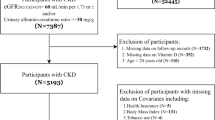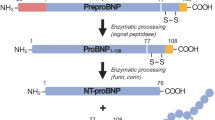Abstract
Background
Patients with end-stage kidney disease (ESKD) are at high risk of cardiovascular disease including stroke, heart failure, and ischemic heart disease (IHD). To prevent the occurrence and progression of CVD, a reliable prognostic cardiac biomarker is essential. We investigated the prognostic value of NT-proBNP for each incident type of CVD.
Methods
Male patients from the Ibaraki Dialysis Initiation Cohort (iDIC) study with preserved serum samples from dialysis initiation day (n = 212) were analyzed. Patients were classified into four groups according to quartiles of baseline NT-pro BNP levels. The relationship between NT-proBNP levels at the initiation of dialysis and the subsequent incidence of hospitalization events due to IHD, heart failure, and stroke was analyzed.
Results
The incidence rate for hospitalization due to IHD was significantly higher in the highest NT-proBNP category (Log rank p = 0.008); those of stroke and heart failure showed no significant differences among quartiles. Cox proportional hazards regression analysis revealed that serum NT-proBNT was the only prognostic factor for hospitalization for IHD after adjustment by major known IHD risk factors. (HR, 1.008; 95% confidence interval, 1.002–1.014; p = 0.01) The ROC curve analysis for the incidence of hospitalization due to IHD showed that NT-proBNP had an area under the curve (AUC) of 0.759 (95% CI 0.622–0.897; p = 0.004) at a cut-off value of 956.6 pg/mL.
Conclusion
NT-proBNP measurement at the initiation of dialysis therapy is useful to predict later hospitalization for IHD.
Trial registration: UMIN000010806.


Similar content being viewed by others
References
Foley RN, Parfrey PS, Sarnak MJ. Epidemiology of cardiovascular disease in chronic renal disease. J Am Soc Nephrol. 1998;9:S16–23.
Cozzolino M, Mangano M, Stucchi A, Ciceri P, Conte F, Galassi A. Cardiovascular disease in dialysis patients. Nephrol Dial Transplant. 2018;33:28–34.
Sudoh T, Kanagawa K, Minamino N, Matsuo H. A new natriuretic peptide in porcine brain. Nature. 1988;332:78–81.
Weber M, Hamm C. Role of B-type natriuretic peptide (BNP) and NT-proBNP in clinical routine. Heart. 2006;92:843–9.
Gardner RS, Ozalp F, Murday AJ, Robb SD, McDonagh TA. N-terminal pro-brain natriuretic peptide: a new gold standard in predicting mortality in patients with advanced heart failure. Eur Hear J. 2003;24:1735–43.
Hunt PJ, Richards AM, Nicholls MG, Yandle TG, Doughty RN, Espiner EA. Immunoreactive amino-terminal pro-brain natriuretic peptide (NT-PROBNP): a new marker of cardiac impairment. Clin Endocrinol. 1997;47:287–96.
Januzzi JL Jr, Camargo CA, Anwaruddin S, Baggish AL, Chen AA, Krauser DG, et al. The N-terminal pro-BNP investigation of dyspnea in the emergency department (PRIDE) study. Am J Cardiol. 2005;95:948–54.
Anwaruddin S, Lloyd-Jones DM, Baggish A, Chen A, Krauser D, Tung R, et al. Renal function, congestive heart failure, and amino-terminal pro-brain natriuretic peptide measurement: result from the proBNP investigation of dyspnea in the emergency department (PRIDE) study. J Am Coll Cardiol. 2006;47:91–7.
Madsen LH, Ladefoged S, Corell P, Schou M, Hildebrandt PR, Atar D. N-terminal pro brain natriuretic peptide predicts mortality in patients with end-stage renal disease in hemodialysis. Kidney Int. 2007;71:548–54.
Satyan S, Light RP, Agarwal R. Relationship of N-terminal pro-B natriuretic peptide and cardiac troponin-T to left ventricular mass and function and mortality in asymptomatic hemodialysis patients. Am J Kidney Dis. 2007;50:1009–19.
Wang AYM, Lam CWK, Yu CM, Wang M, Chan HIS, Zhang Y, et al. N-terminal pro-brain natriuretic peptides: an independent risk predictor of cardiovascular congestion, mortality, and adverse cardiovascular outcomes in chronic peritoneal dialysis patients. J Am Soc Neophrol. 2007;18:321–30.
David D, Kumpers P, Seidler V, Biertz F, Haller H, Fliser D. Diagnostic value of N-terminal pro-B-type natriuretic peptide (NT-proBNP) for left ventricular dysfunction in patients with chronic kidney disease stage 5 on hemodialysis. Nephrol Dial Transplant. 2008;23:1370–7.
Sommerer C, Beimler J, Schwenger V, Heckele N, Katus HA, Giannitsis E, et al. Cardiac biomarkers and survival in haemodialysis patients. Eur J Clin Invest. 2007;37:350–6.
DeFillippi CR, Fink JC, Nass CM, Chen H, Christenson R. N-terminal pro-B-type natriuretic peptide for predicting coronary disease and left ventricular hypertrophy in asymptomatic CKD not requiring dialysis. Am J Kidney Dis. 2005;46:35–44.
Khan IA, Fink J, Nass C, Chen H, Christenson R, DeFilippi CR. N-terminal pro-B-type natriuretic peptide and B-type natriuretic peptide for identifying coronary artery disease and left ventricular hypertrophy in ambulatory chronic kidney disease patients. Am J Cardiol. 2006;97:1530–4.
Tawara T, Usui J, Ebihara I, Ishizu T, Kobayashi M, Maeda Y, et al. Study protocol and baseline characteristics of newly induced dialysis patients: a prospective multi-center cohort study with a biological sample bank, the Ibaraki Dialysis Initiation Cohort (iDIC) study. BMC Nephrol. 2022;23:104.
Sato Y, Ishizaki Y, Aso K, Minakwa A, Toida T, Nishizono R, et al. Characterisation of N-terminal pro-brain natriuretic peptide in dialysis patients and its reduced prognostic significance in the elderly. Sci Rep. 2019;9:6630.
Wang AY, Lai KN. Use of cardiac biomarker in end-stage renal disease. J Am Soc Nephrol. 2008;19:1643–52.
Apple FS, Murakami MM, Pearce LA, Herzog CA. Multi-biomarker risk stratification of NT-pro-B-type natriuretic peptide high-sensitivity C-reactive protein, and cardiac troponin T and I in end-stage renal disease for all-cause death. Clin Chem. 2004;50:2279–85.
Ikeda N, Nakamura M, Yazaki Y, Ono T, Yamamoto M, Ito S, et al. A slightly elevated level of N-terminal pro-brain natriuretic peptide can predict coronary artery disease in a population with normal left ventricular function. Heart Vessels. 2011;26:473–9.
James SK, Lindahl B, Siegbahn A, Stridsberg M, Venge P, Armstrong P, et al. N-terminal pro-brain natriuretic peptide and other risk markers for the separate prediction of mortality and subsequent myocardial infarction in patients with unstable coronary artery disease. Circulation. 2003;108:275–81.
Goetze JP, Gore A, Moller CH, Steinbruchel DA, Rehfeld JF, Nielsen LB. Acute myocardial hypoxia increases BNP gene expression. FASEB J. 2004;18:1928–30.
Ramos LWF, Murad N, Goto E, Antonio E, Silva JA Jr, Tucci PF, et al. Ischemia/reperfusion is an independent trigger for increasing myocardial content of mRNA B-type natriuretic peptide. Heart Vessels. 2009;24:454–9.
Casals G, Ros J, Sionis A, Davidson M, Morales-Ruiz M, Jimenez W. Hypoxia induces B-type natriuretic peptides release in cell lines derived from human cardiomyocytes. Am J Physiol Heart Circ Physiol. 2009;297:H550–5.
Mollmann H, Nef HM, Kostin S, Dragu A, Maack C, Weber M, et al. Ischemia triggers BNP expression in the human myocardium independent from mechanical stress. Int J Cardiol. 2010;143:289–97.
Jernberg T, Stridsberg M, Venge P, Lindahl B. N-terminal pro brain natriuretic peptide on admission for early risk stratification of patients with chest pain and no ST-segment elevation. J Am Coll Cardiol. 2002;40:437–45.
Weber M, Dill T, Arnold R, Rau M, Ekinci O, Muller KD, et al. N-terminal B-type natriuretic peptide predicts extent of coronary artery disease and ischemia in patients with stable angina pectoris. Am Heart J. 2004;148:612–20.
Winkler K, Wanner C, Drechsler C, Lilienthal J, Marz W, Krane V, et al. Change in N-terminal-pro-B-type-natriuretic-peptide and the risk of sudden death, stroke, myocardial infarction, and all-cause mortality in diabetic dialysis patients. Eur Heart J. 2008;29:2092–9.
Whal HG, Graf S, Renz H, Fassbinder W. Elimination of the cardiac natriuretic peptides B-type natriuretic peptide (BNP) and N-terminal pro-BNP by hemodialysis. Clin Chem. 2004;50:1071–4.
Author information
Authors and Affiliations
Consortia
Corresponding author
Ethics declarations
Conflict of interest
The authors have declared that no conflicts of interest exist.
Ethical approval
All procedures performed in the studies involving human participants were in accordance with the ethical standards of the institutional and/or national research committee at the institutions where the studies were conducted (IRB approval number IB1308) and with the 1964 Helsinki Declaration and its later amendments or comparable ethical standards.
Informed consent
Informed consent was obtained from all individual participants included in the study.
The Study Group of the Ibaraki Dialysis Initiation Cohort Study
Refer to the original paper [16].
Additional information
Publisher's Note
Springer Nature remains neutral with regard to jurisdictional claims in published maps and institutional affiliations.
About this article
Cite this article
Shimohata, H., Usui, J., Tawara-Iida, T. et al. NT-pro BNP level at dialysis initiation is a useful biomarker for predicting hospitalization for ischemic heart disease. Clin Exp Nephrol 28, 457–464 (2024). https://doi.org/10.1007/s10157-023-02442-x
Received:
Accepted:
Published:
Issue Date:
DOI: https://doi.org/10.1007/s10157-023-02442-x




